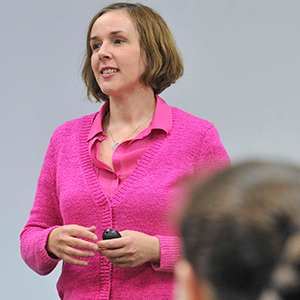Rebecca Gullan, Gwynedd Mercy University – Mentors that Matter
 How important is having a good mentor during college?
How important is having a good mentor during college?
Rebecca Lakin Gullan, associate professor of psychology at Gwynedd Mercy University, discusses the ways a strong mentor can make a difference to students.
Associate professor of psychology Rebecca Lakin Gullan, PhD has been a faculty member at Gwynedd Mercy University since 2009. Gullan received her bachelor’s degree in psychology from Cornell University and her master’s and doctoral degrees in clinical psychology (with a specialization in children and families) from Bowling Green State University. Her research interests include empowerment, sense of community, civic engagement, and identity development in adolescence and emerging adulthood. Gullan has collaborated with colleagues at Rutgers University and The Children’s Hospital of Philadelphia/University of Pennsylvania School of Medicine on intervention and measurement development research related to health violence prevention, empowerment, and mentorship. She has also published research on marital and parent-child interactions in clinic-referred families. In addition to her research, Gullan has served on for both regional and national child advocacy organizations. Gullan was also on the Editorial Board for School Psychology Quarterly, the official school psychology journal of the American Psychological Association and serves as an ad-hoc reviewer for a number of professional journals. Gullan teaches ethics, research methodology and experimentation, and the psychology capstone course.
Mentors that Matter
“Good company for the journey”
With these words, Marcia Baxter Magolda, a leading researcher on mentorship in the college years, captures a fundamental need of young adults as they walk the path toward what Robert Kegan called self-authorship. In our research, my team gathered data from over 300 students on their experiences with college mentors. What we found were four characteristics students identified as critical to strong mentoring relationships with faculty, coaches, and other staff on campus.
Commitment: In part, commitment is demonstrated through the simple act of making time: a strong mentor is there. An equally important aspect of commitment is that both the mentor and student are open to the relationship. In other words, meaningful mentorship happens not only when the mentor provides support, but when the mentee is open to accepting what the mentor has to offer.
Challenge: While a mentor’s recognition and appreciation of the mentee’s strengths is important, the most valued mentors also challenge their mentee’s thinking and encourage them to consider issues from a different perspective. In other words, impactful mentors are both the greatest champions and the most honest critics, each of which is necessary for growth.
Authenticity: Maintaining appropriate boundaries is important in relationships with a power differential. But it is also crucial to have a mentor that is approachable and who the mentee identifies with on a personal level. This connection allows mentors to challenge their mentees to grow in the context of a caring and genuine relationship.
Connection: A strong mentor understands the landscape, and has the ability and willingness to connect the mentee with other people and experiences that can help them become successful members of the wider community.
Through this research, our team developed a quantitative measure of the mentorship that can be used to both measure and strengthen mentor relationships.



